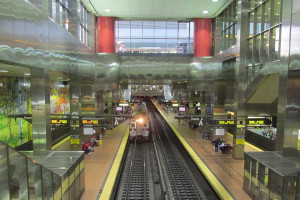Idea: New York and Philly Should Share the Olympics
News out of New York this morning is that the city is kinda-maybe-not really interested in making a bid on the 2024 Summer Olympics.
Staff members in the offices of Gov. Andrew M. Cuomo and Mayor Bill de Blasio have held “very preliminary” talks about the possibility of New York City’s bidding for the 2024 Summer Games, the governor said this week.
De Blasio, speaking at his own news conference Wednesday, played down the significance of the conversations.
“We have not had serious internal discussions about it,” he said, suggesting that he was lukewarm to the idea of attempting another bid. “I think we can safely say that the history of the Olympics, in a variety of cities around the world, has been a mixed bag.”
Philly has also expressed interest in the 2024 Olympics — to similarly lukewarm local response — and really, you can’t blame either city: Hosting the Olympics is a big, expensive, and arduous undertaking: The last two summer games required investments of more than $40 billion from their hosts. Why bother?
On the other hand, if that bigness is now intimidating and scary to the city of New York, maybe it’s time to reconsider the bigness of the Olympic enterprise itself. And that leads to a question: Why can’t New York and Philly — and, yes, New Jersey — share the Olympics?
Think about it: Opening ceremonies in New York. Closing ceremonies in Philadelphia. An Olympic Flame lit in both locations. Games all over the place.Track and field in New York. (And basketball: A gold medal game in Madison Square Garden could be one of the greatest events in the game’s history.) Swimming and gymnastics in Philly. (We might have to build some new venues, though the Wells Fargo Complex should be able to handle a good deal of the gym events.) Cross country, archery, biathlon in the wilds of the Garden State.It kind of makes sense, right?
The corridor is already tied together with some decent rail transportation (though if there were ever a good excuse to build Ed Rendell’s high-speed magnet train of the future, this would be it), as well as plenty of bus options on the highways. No one city would have to absorb too much debt, no city would have to build too many facilities — including hotel spaces — that might fall fallow after the games are over. The cities could share the stress and burden instead of suffering alone. They’d also share the prestige.
Security-wise, the crowds would be spread out over three states, making a less-tempting target. (Sorry to think that way, but somebody will, so might as well.) They’d also spread out among the hotels across the Olympics region, instead of overstuffing everything in one home city.
As a general rule, the Olympics requires one city to develop world-class facilities in every imaginable activity. It’s tough, expensive work. But if several cities each had to build only one or two facilities each (as was sort of done in Nagano and Albertville), that might suddenly become more manageable. It might even be fun.
The only problem with this idea? While it’s been used to help relatively small towns (see Albertville and Nogano above) host the Olympics, big cities have never attempted it: Would the International Olympic Committee consent to a spreading out of the games? Could New York, New Jersey, and Philly put aside their natural rivalries to produce a whole new kind of Olympic Games? It’s our best shot at being host — and maybe New York’s, too. And getting a fractious region to cooperate to create those games? That might represent the best of the Olympic spirit.
Find @JoelMMathis on Twitter.


